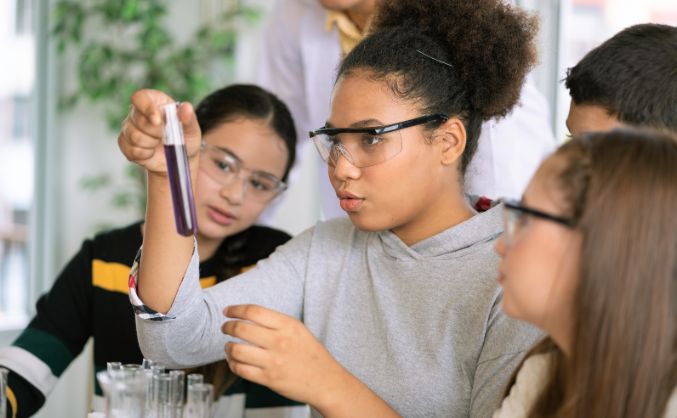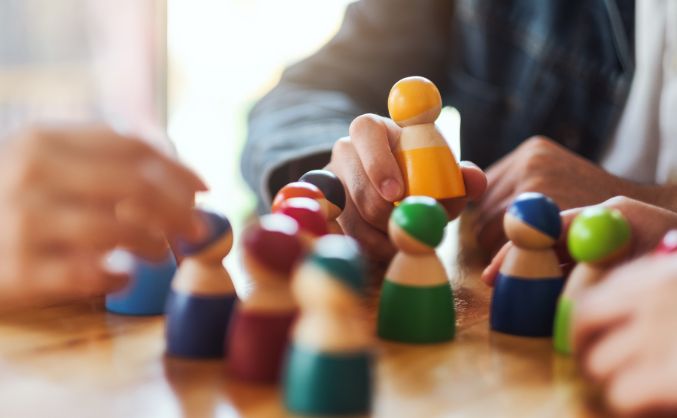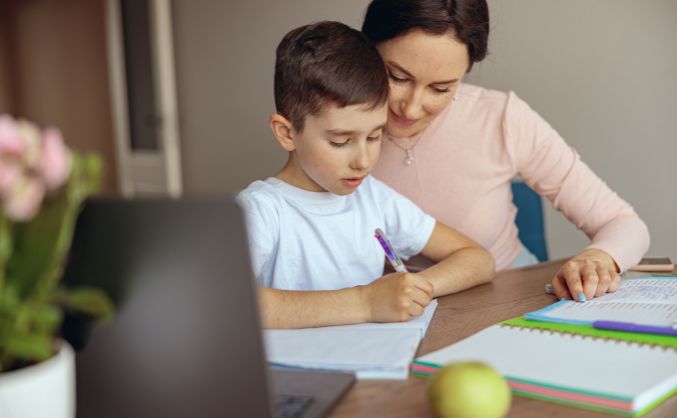Learning to educate children well is a challenge, but it is also a wonderful time of discovery. As parents, we naturally want to support our children’s learning process and help them reach their full potential. But with so much information available, it can be overwhelming to know where to begin.
This parent’s guide has advice from experienced educators and practical tips to help you with your child’s education. Are you seeking parenting tips for toddlers or do you need teaching advice for a middle school student? Our tools can empower you to create a supportive and enriching learning environment at home.
Understanding Your Child's Learning Style

Every child has a unique learning style that impacts their learning ability. For instance, some children thrive in hands-on environments, soaking up information through play and exploration (kinesthetic learners). Others absorb information through things they read or see (visual learners) or verbal explanations (auditory learners). Recognizing your child’s learning style allows you to tailor your approach and choose educational activities that resonate with them.
Here are some tips to help you discover your child’s learning style:
- Observe their play: Pay attention to how your child interacts with their surroundings. Do they gravitate toward physical activities, like building block towers (kinesthetic)? Does your child enjoy looking at picture books, studying maps, reading novels, or watching instructional videos (visual)? Or do they prefer listening to stories and music (auditory)?
- Notice their learning preferences: Does your child seem to retain information when you write it down? Do they excel at following spoken instructions? Observing their preferences during learning activities can offer clues.
- Talk to their teachers: Educators have valuable insights into your child’s classroom behavior and learning patterns. Discuss their observations to get a well-rounded picture of your child’s learning preferences and developmental milestones.
Embrace the Power of Playful Learning

Play is not just a fun pastime for children; it’s an important element in their early learning process. Children develop essential skills like problem-solving, creativity, communication, and social interaction when playing.
Here’s how you can incorporate playful learning into your child’s daily routine:
- Turn everyday activities into learning experiences: Counting groceries at the store reinforces math skills. Emphasizing letters and sounds during story time sparks early literacy development.
- Provide open-ended toys and materials: Building blocks and art supplies encourage creativity and exploration, perfect for fertile imaginations.
- Engage in interactive play: Play games, sing songs, dance, put on plays, and read stories together. These activities foster parent-child bonding while strengthening language and social skills.
Building Strong Educational Support at Home

As your child progresses through their educational journey, the learning environment at home becomes increasingly important. Here are some ways to create a supportive and stimulating space:
- Establish a designated learning area: Have a quiet, organized space for reading, writing, or completing homework. A calm setting can help your child focus and minimize distractions.
- Lead by example: Show your child the value of learning by trying to learn something new every day. Read books, explore educational websites together, or take on new hobbies with them.
Create a positive learning environment: Approach learning with encouragement and praise effort over perfection. Celebrate their successes, no matter how small, to foster a love of learning.
Parenting Tips for Toddlers:
The toddler years are a whirlwind of exploration and discovery! Here are a few tips to nurture your curious toddler’s love of learning:
- Get outside and explore: Nature walks are a fantastic way to learn about the world. Show your toddler different colors, shapes, and textures, then encourage them to ask questions.
- Limit screen time: While some educational apps can be beneficial, prioritize interactive play and real-world experiences.
Read together every day: Invite your toddler to snuggle on the couch, then reach for a book. Let them choose stories they’re interested in and encourage them to describe pictures or ask questions.
Tips for K-8 Parents:
The K-8 years are a critical time for academic development. Here are some educational tips for parents with school-aged children:
- Develop open communication with teachers: Communicate with teachers to stay informed about your child’s progress and learning goals.
- Establish a homework routine: Create a dedicated time for homework each day, ensuring a quiet and distraction-free environment. Solid time management skills can help your child succeed in school and life.
Incorporate educational activities outside school: Visit museums, libraries, and historical sites to bring learning to life. Encourage your child to explore their interests through age-appropriate educational resources. You can implement these educational tips for students alongside strong educational support strategies at home.
Educational Tips for Students:
Learning can be an exciting adventure that leads to growth and discovery! Here at Bethany School, we encourage our students to take an active role in their education. Here are a few tips to help you become a super-learner:
- Be curious: Ask questions, explore new ideas, and don’t be afraid to make mistakes; mistakes are stepping stones to growth!
- Organize your learning materials: Keep your schoolwork tidy, and develop a study routine that works for you.
- Identify your learning style: Is it easier to remember things when you listen, read, or do something physical? Once you know how you learn best, you can tailor your study habits for success.
- Collaborate with your peers: Studying with a friend or classmate can be a great way to learn from each other and solidify concepts.
- Don’t be afraid to ask for help: Your teachers are there to support you. If you’re struggling with a concept, don’t hesitate to ask for an explanation or extra help.
- Make learning fun: Use games, puzzles, or creative projects to solidify your understanding.
- Celebrate your successes. Acknowledge your achievements, great and small. This will help you stay motivated and keep reaching for your goals.
Partner with Bethany School for a Strong Educational Journey
Bethany School is one of the top schools in Cincinnati, OH, for children in Pre-K through 8th grades. We believe in fostering a lifelong love of learning, a passion that extends beyond the classroom. As such, we believe in nurturing the whole child. Since 1898, we’ve maintained a welcoming, inclusive community that celebrates diversity and respects individual learning styles.
Moreover, our small class sizes feature a 6:1 student-teacher ratio, ensuring personalized attention for each child. We create a joyful learning environment that blends play, discovery, and a strong academic foundation.
Indeed, Bethany School prepares students for success in school, work, and life! We are fully committed to project-based learning. To that end, we combine cutting-edge technology with hands-on activities to inspire curiosity and hone critical thinking.
Our graduates attend top high schools because of the strong foundation we give them.
Bethany is Ohio’s only Episcopal school. Our tradition encourages spiritual growth and an honest exploration of faith. We want our students to discover what spirituality means, realize their potential, and find their place in the community.
At Bethany, you will find a nurturing and stimulating environment where your child can thrive. We offer a strong core curriculum, engaging electives, and after-school activities for different learning styles and interests. These educational development strategies ensure a well-rounded educational experience for all students.
Are you looking for a school in Cincinnati, OH, that values academic excellence and celebrates individuality? At Bethany School, we know how to foster a lifelong love of learning! Visit our website to learn more about our admissions process and schedule a tour today!
FAQs about Bethany School
What are the benefits of Bethany School's small class sizes?
Bethany School’s small class sizes, averaging 15 students with a 6:1 student-teacher ratio. Teachers can tailor their instruction to individual needs and learning styles so each child receives the support they need. Smaller classes also create a strong sense of community, allowing students to build close relationships with peers and teachers.
How does Bethany School celebrate student individuality?
At Bethany School, we celebrate what makes each child unique. Our inclusive environment embraces students from all backgrounds and promotes a sense of belonging.
Furthermore, we encourage students to explore their talents and interests through sports and extracurricular activities. Children participate in music, art, dance, STEM, robotics, 3D printing, stock market games, mock trials, and more.
How does Bethany School prepare students for high school?
Bethany School combines challenging academics with project-based learning and hands-on activities. This approach equips students with the critical thinking and real-world problem-solving skills needed to excel in high school and beyond.
Additionally, we integrate technology into our academic program. Our students feel confident using technology before starting high school and taking tech-focused classes.
How does Bethany cultivate global citizens?
At Bethany School, we seek to cultivate a global mindset. For instance, our curriculum explores diverse cultures and viewpoints, fostering empathy and understanding of the world. We empower students to become responsible global citizens, ready to make a positive difference on a larger scale.
